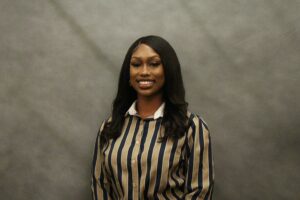
Imani Johnson
E-mail: ijohn2@lsuhsc.edu
- Past/current experiences working in the field of disabilities:
I worked over a year as a behavioral analyst at the Center for Autism and Related Disorders, a nationally-recognized organization providing applied behavioral analysis to children of all ages and of all ranges of the autism spectrum. Working with children with autism has taught me many invaluable skills, such as patience, reflection, and even the ability to celebrate small victories. Additionally, I have worked as an OT intern at an adaptive gym, called Split Second creating and implementing workout plans for those of different abilities—such as Down’s Syndrome.
- Goals for your LEND training experience:
My goals for my LEND training is to develop confidence and courage in my education to be able to affirm, advocate, and guide children and families with disabilities. I also want to become knowledgeable about policy –as it relates to education, maternal health, and healthcare. I hope to develop an idea for policy or suggest a study during my time in the program to advance the way people with disabilities are included in community, and society at large. I also hope to continue to build a network of professionals who can well-experienced in this space.
- What do you wish to contribute, in the future, as a professional/self-advocate/family member in the field:
I see a great need for OTs to encourage families to seek early intervention and help parents of children with disabilities/illnesses to become advocates of their own, especially in communities with higher instances of poverty, lack of health education, and accessibility to preventative health services. It is widely known that disability is both a cause and consequence to poverty and considering social determinants of health, I would want to use my formal OT education and experience to address these factors around disability. I want to provide children and families with tools to best equip themselves so that they can thrive in a variety of settings: home, school, or out in the community. I also have plans to become an “Learn the Signs, Act Early” (LTSAE) Ambassador after learning about this initiative last year at the Association of University Centers of Disabilities Conference (AUCD).

 myLSUHSC
myLSUHSC